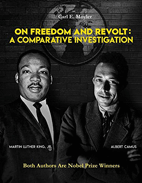
 |
Albert Camus was born in Algeria to a poverty-stricken, handicapped mother and a father who died in World War I when the boy was only one. Camus was a diligent student and attained a university degree while suffering from tuberculosis. In his youth, he saw the ravages of neediness in Algeria and the horrendous trials suffered by his fellow Europeans. He would become an editor, novelist, playwright, and an active member of the French Resistance against the Nazis. He transmuted his reverence for freedom into a godless but humanitarian philosophy known as absurdism and was a strong advocate for racial, ethnic, and international unity. He had a gift for revealing the truth of those concepts through novels and plays that garnered popular success, and he won the Nobel Prize in Literature in 1944. He died three years later in a car accident. The author examines Camus through his life and many writings, including such works as The Myth of Sisyphus, depicting how even the most useless, punishing labor can evoke heroism.
Martin Luther King was so advanced a student that he began college at age 15, graduating while still in his teens, by which time he was powerfully drawn to the non-violent ethic of Mahatma Gandhi and rejected prospects to become a well paid professional in favor of the Christian ministry. A member of the NAACP, he was energized by the protests in Alabama against racial discrimination provoked by the non-violent action of Rosa Parks and soon assumed his role as a trailblazer for African Americans and other disadvantaged groups in the civil rights era. An intellectual preacher, King was an eloquent speaker. The author cites among his other writings a collection of sermons, Strength to Love, highlighting King’s basic belief that “theology must walk step by step with social change.” King was jailed, his home was bombed, and he lived under threat by segregationist opponents. He received the Nobel Peace Prize in 1964 and died by an assassin’s bullet in 1968.
Two men who shared fame and recognition for their humanitarian views in the twentieth century, but whose similarities have not before now been explored in-depth, are examined here by Moyler in a systematic, rational manner. The author weaves a tapestry of commonality between the lives and accomplishments of these two influential men: one an inspirational, religious African American leader who encouraged basic human rights for all people; the other an imaginative truth-seeker who never forgot his roots in poverty and urged the unity of all humans, who, he believed, are drawn to act morally even in the absence of religious truth.
Prepared as an academic thesis aimed at establishing the common ground between these two noted individuals, Moyler’s book is highly organized, containing numerous reference points for further study. Each chapter is summarized, and one section lists organizations and initiatives currently in operation that embody, in the author’s estimation, the principles of Camus and King. Moyler concludes that these two influential individuals were, in their uniquely gifted ways, champions of freedom who stood firmly, by word and deed, against oppression and injustice in all its forms. In drawing these detailed comparisons, Moyler amply demonstrates his own astute intelligence and gives thoughtful readers much scope for further investigation.
RECOMMENDED by the US Review